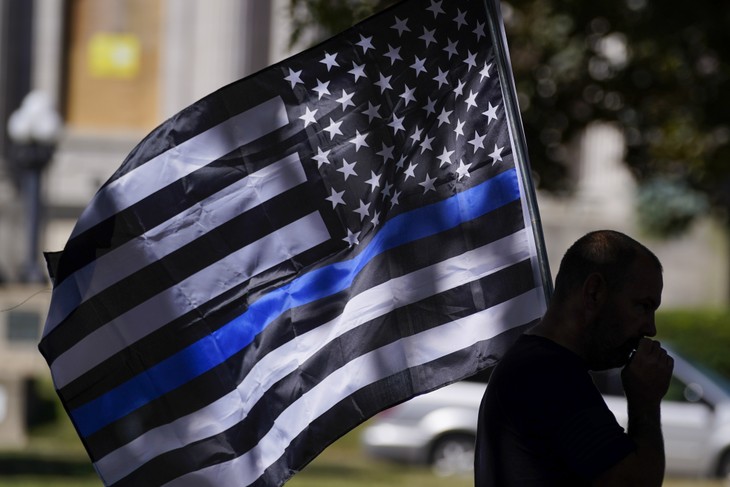
If you enjoy wearing support for police on your sleeve — or anywhere else on your person — employment at a Maryland district court isn’t for you.
On Wednesday, a judge in the state laid down the law for workers: No apparel of the “thin blue line” sort will be tolerated.
As reported by CBS Baltimore, Chief Judge John P. Morrissey’s email banned masks and other clothing bearing the pro-cop reference.
Such order applies to bailiffs, constables, clerks, commissioners, staff, and judges across 34 district courthouses.
As for visitors, they’re exempt.
Support for law enforcement certainly isn’t what it used to be.
In Tennessee recently, a 4th grade teacher showed students a cartoon proclaiming, “[Cops] don’t like black men.”
And in New Orleans, this month’s planned “Blue at the Zoo” event — in favor of law enforcement — was called off.
The reason: It was deemed too “divisive.”
Evidence of the tables having been turned can be found in a variety of cultural sectors.
The last few decades’ television shows and movies frequently featured police as the good guys. Yet, last year saw the cancellation of boob tube hits Cops and LIVE PD.
Earlier this month, a policewoman referred to rioters in a Facebook post as “terrorists.” The police chief apologized and the officer was fired.
You might say law enforcement’s no longer getting the benefit of the doubt.
Regarding divisiveness, Chief Judge John noted the court had been informed of the “issue of perceived bias” blue-backing masks and other clothing had caused, per CBS Baltimore.
And as observed by CBS13, the “thin blue line” mantra has recently “become politically charged and used by counter-protesters at rallies for racial justice and the Black Lives Matter movement.”
In a court setting, staff sporting political or social endorsements isn’t an unreasonable concern — even, evidently, to law enforcement.
But is the principle being applied evenly?
Maryland Fraternal Order of Police President Clyde Boatwright posed that very question to WJZ:
“We certainly understand what the judge is trying to accomplish here. But the concern we would have is, is this type of restriction for all advocacy groups?”
Perhaps it doesn’t have to be: We’re told America’s police force is systemically — that is, structurally designed to be — racist.
Curiously, such is being said of general systems…by the leaders of general systems.
Yet, they remain in charge.
And law enforcement is being shunned by those who make the laws they’re required to enforce.
It’s a strange time.
There’s a great chasm between now and just a few years ago; it’s much more than a thin line — blue or otherwise.
But as for the blue — if you’re a district court worker in Maryland — you’ll have to keep your support out of the workplace.
